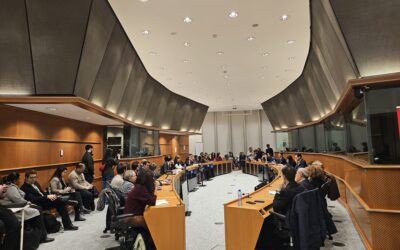13 March is International School Meals Day, a fundamental date to reflect on the importance of guaranteeing every child access to healthy and sustainable school meals. This day is not only an opportunity to celebrate the progress made, but also a call to all of us to do more and ensure that every child, wherever they are, has access to a nutritious meal every day.
The importance of school meals
School meals go far beyond simply satisfying nutritional needs. Schools are crucial places for education and training, but they are also centres for health, sustainability and social justice. Offering healthy meals not only supports children’s physical growth, but also educates them in conscious eating behaviour and prepares them to make more sustainable choices for their future. School meals are therefore a fundamental pillar in building a healthier, more informed and more environmentally conscious generation.
The challenge of the European Child Guarantee
In 2021, the European Union adopted the European Child Guarantee, an important promise to combat child poverty and guarantee access to essential services for all children. Among these, the provision of nutritious school meals is one of the key objectives. Despite this commitment, currently only 14 of the 27 EU Member States have included school meals in their national action plans.
The reality is that almost 1 in 4 children in the EU are at risk of poverty and social exclusion, which represents around 20 million children. This means that millions of children do not have access to healthy meals every day and are deprived of the opportunity to grow up healthy, learn better and face the future with more opportunities. This is a fact that should make us reflect and spur us to action.
The role of SchoolFood4Change
In this scenario, projects like SchoolFood4Change are making a tangible difference. This ambitious project has involved 2,892 schools in Europe, promoting healthier and more sustainable school nutrition. Thanks to SchoolFood4Change, schools are serving meals with more fruit and vegetables, reducing food waste and training staff to cook more nutritious dishes. In this way, a system is being created that not only feeds children, but also educates them to respect the environment and sustainability.
Network progress
SchoolFood4Change has already achieved remarkable results:
- 36 municipalities are leading the change by introducing sustainable school food.
- 458 schools have trained their staff to cook more nutritious meals and reduce food waste.
- 2,669 schools are serving healthier meals, with a greater proportion of fruit and vegetables.
- 608 schools are offering food education programmes, creating a direct link between children and local farmers, promoting a deeper understanding of how the food system works.
These advances are important, but it is clear that change must be even more widespread. International School Meals Day is a reminder that every child, regardless of their economic status, should be able to enjoy healthy and free school meals. The challenge now is to extend these successful models to all schools and all children, everywhere.
Ensuring a healthy future for all children
On International School Meals Day, it is essential to take a step forward towards a shared goal: to ensure that every child has access to healthy and free school meals. We must support the EU Child Guarantee and urge European governments to recognise school meals as a fundamental right for every child, rather than an optional service.
A healthy future for all children depends on food education and the promotion of sustainable school meals, which are essential for well-being and growth. Although significant progress has been made, a collective effort is needed to ensure that no child is left behind.
Support the petition for the introduction of free healthy school meals in all schools. Change is happening, but only with a joint effort will it be possible to guarantee that all children have the same opportunities.




